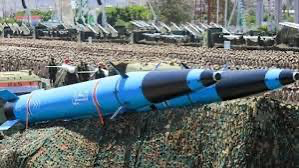An Iranian cargo ship, the MV Golbon, carrying a key ingredient for ballistic missile fuel, is just days away from docking at Bandar Abbas in Iran.
The vessel, believed to be transporting sodium perchlorate—an essential compound for producing ammonium perchlorate, used in solid-fueled ballistic missiles—is expected to arrive on February 14.
The 28,000-tonne ship, flagged under the Islamic Republic of Iran Shipping Lines (IRISL), is reportedly carrying 34 containers of sodium perchlorate pellets, as first disclosed by the Financial Times. Meanwhile, its sister ship, the MV Jairan, remains stationary at the Xiushan Island anchorage, east of Shanghai, possibly awaiting its own 24-container consignment.
Strategic Importance of Sodium Perchlorate
Sodium perchlorate is a critical material processed at Iran’s Parchin facility, south of Tehran, to create ammonium perchlorate, which comprises 70% of the fuel for many of Iran’s ballistic missiles. Missiles fueled by this material include:
•Khybar-Shikan (medium range)
•Fattah (medium range)
•Fateh-110 (short range)
•Zolfaghar (short range)
These missiles have been deployed extensively, targeting shipping, infrastructure, and military sites across Israel, Saudi Arabia, the UAE, and Ukraine. They have also been exported to Russia and Axis of Resistance allies.
Sanctions and Risks
The IRISL vessels are subject to secondary US Treasury sanctions and have drawn attention under UN Security Resolution 1929 (2010), which warns against IRISL’s role in sanctions-breaking activities, particularly those involving missiles and missile systems.
Iran is currently believed to be facing a shortfall in ammonium perchlorate supplies, largely due to Israeli strikes on missile production facilities and increased demand to replenish stocks used in recent strikes and exports to Russia.
Both ships are sailing with their AIS tracking systems active, making their locations easier to monitor. Notably, the ships no longer bear IRISL’s signature markings, perhaps to evade scrutiny.
Broader Implications
The shipment highlights Iran’s ongoing efforts to rebuild its ballistic missile capacity amid rising geopolitical tensions. The material’s arrival could bolster Iran’s domestic missile production and support exports to its allies, escalating regional and global security concerns.

